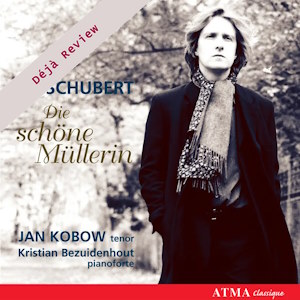
Déjà Review: this review was first published in October 2005 and the recording is still available.
Franz Schubert (1797–1828)
Die schöne Müllerin D 795
Jan Kobow (tenor), Kristian Bezuidenhout (fortepiano)
rec. 2003, St. Andreaskirche, Berlin, Germany
Atma Classique ACD22315 [61]
The main reason for issuing yet another recording of Die schöne Müllerin is, according to the performers: “…we aimed for a more rhetorical, ‘live-for-the-moment’ approach to the text, especially in the strophic songs. Moreover, to help characterize these small-scale events, we treated tempo flexibility as a perfectly viable expressive device. We also opted in favour of adding certain improvised embellishments, including freely applied arpeggiation in the piano. Finally we decided to use a modern replica of an early 19th-century piano with its vast spectrum of color and articulation.”
When it comes to the embellishments of the song lines, it is not done without deep consideration. Kobow and Bezuidenhout have even studied the changes to the voice-part that Johann Michael Vogl, the famous Viennese baritone, made and that luckily have been preserved. Vogl was regarded as the foremost interpreter of Schubert’s songs during, and also after, the composer’s lifetime and was greatly admired by the composer.
All this of course sounds thrilling and innovative and it was with a great deal of curiosity and expectancy that I put the CD in my player. What came out of it was far less revolutionary than I had anticipated, and following the performance with the 1970 Dover edition in hand, which is “an unabridged republication of selected sections from Series 20 (Lieder und Gesänge) of Franz Schubert’s Werke, Kritisch durchgesehene Gesammtausgabe, originally published by Breitkopf & Härtel, Leipzig, in 1895″, I found modest, very tasteful alterations and additions to the “original” but also in several cases melismas and other decorations in the printed music not observed by Kobow. Yes, there are embellishments and some interpretative freedom in the piano-part: a broken chord here, some dotted rhythms there, where the score even has semiquavers, but all this is done so discreetly and in such a musicianly way that probably no one would react let alone be upset.
What is beyond doubt is that this is a very fine performance, one that catches you from the start and holds the interest through the twenty songs. One obvious reason for this is the choice of instrument and the playing of it. South African born Kristian Bezuidenhout, who teaches fortepiano and 18th-century performance practice at the Eastman School of Music, is an excellent accompanist and having worked extensively with Jan Kobow he has an instinctive feeling for when to hold back and when to move forward. The piano part is exquisitely translucent without losing any of the power of the writing. The fast moving Am Feierabend (track 5) shows both artists at their best. The freedom they allow themselves according to their concept means that the rhythms and the ebb and flow of the music are always alive – no metronomic rigidity here. The nervous eagerness of Ungeduld (track 7) is also finely caught.
I first became aware of Berlin-born Jan Kobow when I reviewed the Naxos recording of Haydn’s Die Schöpfung earlier this year (review). He made a favourable impression then and he seems on this hearing to be an ideal Lieder-singer with a colourful voice that obviously obeys his every interpretative wish. His is a full-blooded, expressive but still lyrical voice, a far cry from some Lieder-singing tenors’ anaemic sounds. There is a freshness and susceptibility about his approach. Probably this is the outcome of all this re-thinking that, however radical it may seem in theory, does not basically change the musical message but paves the way for a more open-minded reading of the text – and the music – and at the same time blows away some cobwebs. Although I have copious notes on my note-pad I leave it to the listener to explore the many wonderful things on this disc, but the jubilant end of Trockne Blumen (track 18): “…der Mai ist kommen, der Winter ist aus.” is something to treasure, just as the last song of them all, Des Baches Wiegenlied (track 20) where they end the last stanza with a marked ritardando on “… der Himmel da oben wie ist er so weit!” and a long fermata on the last word, whereupon the remaining three-bar piano postlude makes the cycle come to a definitive stand-still.
Others may think that this re-thinking is more revolutionary than I do; to me this is one of the freshest and most uplifting interpretations of Die schöne Müllerin I have come across for a very long time. Perfectly balanced sound, a thought-provoking analysis by Susan Youens and the lyrics in three languages further enhance the attraction of this issue. I will eagerly look forward to their next collaboration – why not a Winterreise?
Göran Forsling
Buying this recording via a link below generates revenue for MWI, which helps the site remain free



















